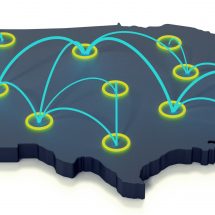Residents of non-licensing states can follow our step-by-step guide below to get your Texas Designated Home State (DHS) insurance claims adjuster license. We’ve also included information on how to renew your Texas DHS license and what reciprocity looks like for TX adjusters so you’ll have everything you need to obtain and maintain your license.
If you live in a state that doesn’t license insurance claims adjusters, you need to get a Designated Home State or ‘DHS’ license. A DHS license allows you all the privileges of an adjuster from a licensing state, and it is basically required by most major employers if you want to work in the claims industry. You can learn more in our blog article: When Does an Adjuster Need a DHS?
Are you a Texas resident? Read our How to Become an Insurance Adjuster in Texas article for instructions on how to get your resident Texas license.
Let’s get started!
#1: Meet the Basic Requirements for the Texas Adjuster License
Before you start taking steps to get your Texas DHS license, make sure you meet Texas’ basic requirements.
- Be a U.S. citizen or legal alien with a work authorization from the Immigration and Naturalization Services
- Be at least 18 years of age
- Not hold a resident adjuster license in another state
If you meet these basic requirements, it’s time to take the pre-licensing course and ace your state exam.
#2: Take Our Texas All-Lines Pre-Licensing Course and Pass the Exam
While Texas residents have the option to choose between an All-Lines or P&C adjuster license, the DHS license is only offered for All-Lines so you want to make sure and pursue that option.
Texas is also one of a handful of states that allow a state-approved pre-licensing course with exam to provide an exemption from the state exam. AdjusterPro makes it easy. Our Texas All-Lines Adjuster Pre-licensing Course is 100% online. No additional testing or coursework is required.
After you complete the required 40-hour pre-licensing course, you’re given a 150-question, multiple-choice exam which you will also take online. You must correctly answer at least 70% of the questions to pass. Once you pass the included exam, you are qualified to apply for your Texas adjuster license.
Our course has been rigorously prepared and is regularly updated. Our online classroom allows you to print reference materials, take practice tests, and even create your own quizzes to help with subjects you are struggling with. We recommend moving on to the exam only after you’re consistently making 90% on your practice tests and passing all the quizzes with flying colors.
How to Become an Insurance Adjuster in 5 Steps
Getting your home state or designated home state license is a great start. See what else it takes to establish a successful career in the insurance claims industry.
#3: Submit an Application for Your Texas Adjuster License
Once you’ve taken the required pre-licensing course and passed the included state exam, you’re ready to apply for your Texas Designated Home State (All-Lines) adjuster license.
Texas requires applicants to submit a fingerprint background check with their license application. The fingerprints are used to check your criminal history records of the Texas Department of Public Safety (DPS) and the FBI. You can schedule an appointment to get fingerprinted through IdentoGO using the service code 11G6QF.
Visit the Texas Fingerprint Requirements page to see detailed instructions on submitting your fingerprints to the state.
After fingerprinting, submit your adjuster application through Sircon. Remember to choose the Texas Designated Home State All-Lines license on your application.
You can check to see if your Texas DHS Adjuster License has been issued on TDI’s License Search page.
#4: Complete Texas Continuing Education and License Renewal Requirements
Once you have your DHS license, you’ll need to complete some additional steps (the same as resident adjusters) every few years to keep it active. Texas DHS adjusters are required to complete 24 hours of continuing education (CE) every two years to renew their license. Licenses must be renewed every two years, on the last day of the licensee’s birthday month.
The 24 hours of continuing education must include 2 hours of Ethics.
You cannot receive credit for any course more than once in any CE reporting period. Excess CE hours cannot be carried over into the next compliance cycle.
To ensure there is no delay in renewing your license, Texas recommends completing your continuing education hours at least 30 days before your license expires. This allows time for the CE provider to report course completion of the course to them.
Renew your license through TDI License Renewal.
AdjusterPro offers over 40 hours of state-approved continuing education courses for Texas adjusters. Courses can be purchased individually or as a discounted bundle that will completely fulfill the 24-hour requirement.
View Continuing Education Courses for Texas Insurance Adjusters. These courses are approved for both resident and DHS license holders.
Additional Information for Texas Insurance Adjusters
Now that you know how to become an adjuster, let’s take a detailed look at the fees and costs of getting and maintaining your Texas DHS license.
Texas Adjuster Licensing Fees
- AdjusterPro Texas All-Lines Pre-Licensing Course + Exam: $279
- Fingerprinting Fee: $70
- License Application Fee: $50
- License Renewal Fee: $50
Texas Adjuster License Reciprocity
Reciprocity means an adjuster holding a home state license can apply for an adjuster license in another state without having to take that state’s exam. And it is one of the main reasons for getting a DHS License.
With your Texas DHS License, you’ll receive the same reciprocity privileges as resident adjusters. This is vital for both finding employment and maintaining a successful career. If you want to learn more about reciprocity and why it’s vital to your success, visit our Reciprocity: The Truth About Adjuster Licensing Agreements Between States blog article.
Fees for reciprocal licenses vary by state, but on average you can expect to pay between $40 and $60 per application, although a few states charge up to $120. To see what states will offer reciprocal licensing privileges to Texas adjusters and DHS adjusters, visit our Texas Adjuster Reciprocity Map. At the bottom of the page, we also offer a downloadable guide to help you prioritize which reciprocal licenses you should get first.
Texas grants reciprocal licenses to adjusters who are licensed in their home state or who hold a Designated Home State (DHS) license, as long as that state grants reciprocal licenses to Texas adjusters. California, Hawaii and New York do not offer reciprocal licenses to Texas adjusters.
Texas Department of Insurance Contact Information
Website: Texas Department of Insurance
Texas DOI Designated Home State Licensing Page
Mailing Address:
Texas Department of Insurance
Agent & Adjuster Licensing Office
PO Box 149104
Austin, TX 78714-9104
Phone: 512-676-6500
Fax: 512-490-1029
Email: license@tdi.texas.gov
Obtaining your home state license is the first step to a career as an insurance adjuster. Once you obtain your Texas DHS adjuster license, you should apply for reciprocal licenses so you can work in more states, making you more attractive to potential employers.
No matter where you’re at in your insurance adjusting career, we can help.



